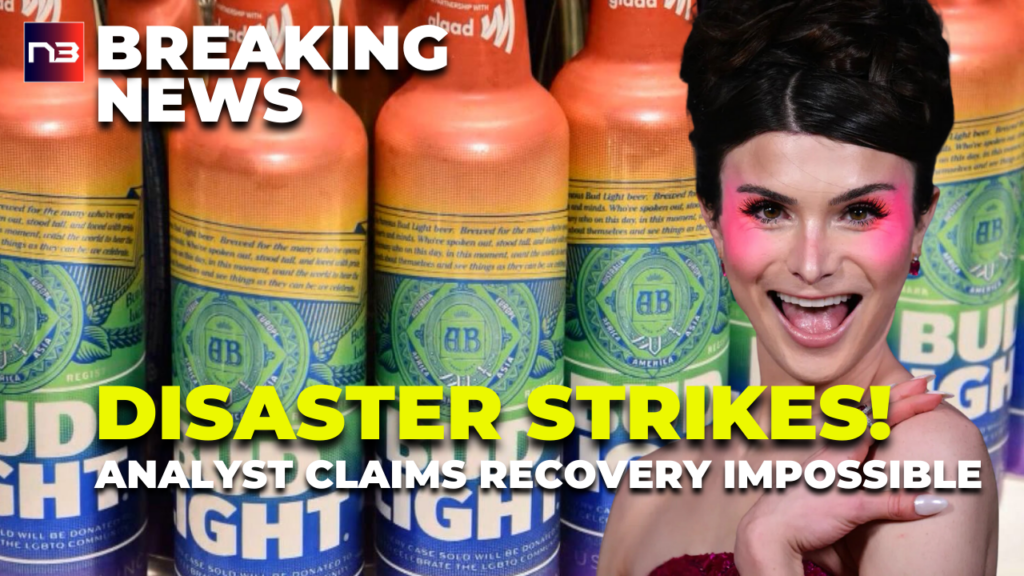Prepare for a shocking revelation! Bud Light, a beer synonymous with American culture, is in the midst of a catastrophic decline. After embracing a divisive virtue-signaling campaign, Bud Light is facing a permanent loss of nearly 25% of its business. The fallout from this controversy has sent shockwaves through the beer industry and raised serious questions about the brand’s future.
In a recent article published in Barron’s, Deutsche Bank analyst Mitch Collett delivered a devastating blow to Bud Light, indicating that recent underperformance suggests a permanent reduction in Anheuser-Busch InBev’s (ABI) U.S. business. Collett’s proprietary survey data reveals that 24% of Bud Light consumers have completely abandoned the brand, while an additional 18% are purchasing less of it.
Collett’s analysis highlights the significant challenges Bud Light faces, particularly with older consumers. However, he cautiously suggests that the forward-looking data sets indicate some potential for the challenges to fade, offering a glimmer of hope for the iconic beer brand. Nevertheless, concerns persist as other experts predict a grim future.
Evercore analyst Robert Ottenstein warns that Bud Light will experience a permanent loss of between 15% and 20% of its volume, followed by a resumption of declines at the average rate of the past decade. This grim forecast also extends to Budweiser, with Ottenstein asserting that consumers lost in 2022 will never return.
The impact of Bud Light’s virtue-signaling debacle cannot be ignored. In May, HSBC downgraded the stock to “hold,” citing the ongoing “Bud Light crisis” and suggesting deeper underlying problems within the company. The brand’s leadership is under scrutiny, with questions arising about their ability to navigate cultural transformations successfully.
The fallout from Bud Light’s ill-fated promotional exercise with transgender TikTok influencer Mulvaney continues to plague the brand. Weekly sales data from Bump Williams Consulting and Nielsen IQ reveals a staggering 26.8% year-over-year sales decline for Bud Light, marking the worst week yet for the iconic beer.
To add insult to injury, Bud Light’s long-held position as the best-selling brand in the United States was usurped by Constellation Brands-owned Modelo Especial in the month of May. The industry data paints a bleak picture for Bud Light, which now finds itself at the number two spot.
Executives within Anheuser-Busch, Bud Light’s parent company, have attempted to downplay the controversy. CEO Michel Doukeris attributes the sales decline to online “misinformation” and denies any partnership with Mulvaney, claiming that it was merely one can featuring the influencer’s face. However, Mulvaney’s social media posts contradict this narrative, leaving the company’s credibility in question.
As public figures and conservative influencers took to Twitter to express their outrage, a boycott movement gained momentum. Consumers rallied together, determined to send a message to corporations pursuing a “woke” leftist agenda. The backlash intensified, impacting not only Bud Light but other Anheuser-Busch-owned beer brands such as Budweiser, Natural Light, and Michelob Ultra, all experiencing significant declines.
In response to mounting pressure, Bud Light launched a new promotional campaign to salvage its reputation. However, social media users condemned the efforts, demanding an apology for the partnership with Mulvaney. The boycott remains in full force, with consumers unwavering in their principles.
In the midst of controversial debates and brand clashes, Bud Light finds itself at a crossroads. The fallout from their virtue-signaling fiasco has resulted in a catastrophic loss of business and damaged their reputation. As Bud Light struggles to regain its former glory, the brewing giant faces an uncertain future.



